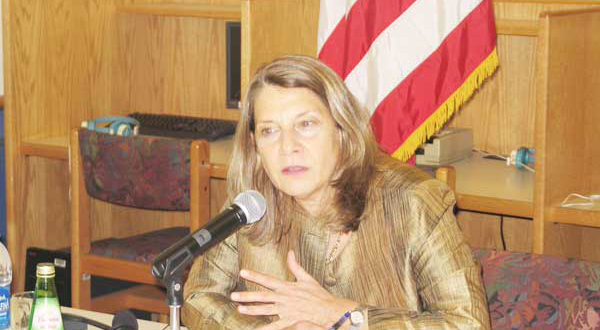 CAIRO: Egypt is one of the countries the US is looking to expand trade with in a bid to double its exports within five years and alleviate the effects of the global financial crisis.
CAIRO: Egypt is one of the countries the US is looking to expand trade with in a bid to double its exports within five years and alleviate the effects of the global financial crisis.
In March, US President Barack Obama announced the launch of the National Export Initiative to achieve the doubling of exports within half a decade and create more jobs in the US to help alleviate the rising unemployment rate resulting from the credit crisis.
Margaret Keshishian, the US Regional Commercial Counselor for Egypt and Lebanon reiterated that stance during a roundtable discussion at the US Embassy in Cairo on Wednesday, stating that Egypt was an attractive country for US trade.
“We are looking to expand trade between US and Egypt. Egypt is a very attractive market for US companies because it’s the most populous Arab country [and] it has weathered the financial crisis very well … and it’s a strategic location as the gateway for Europe, the Middle East and North Africa,” she said.
As part of this increased focus, the US Department of Commerce is organizing a trade mission in March 2011 to bring 12-20 companies to Egypt and Morocco to look at infrastructure projects, with a focus on ports.
Egypt has recently revamped the port at Alexandria, increasing its cargo handling capacity to 44 million tons per annum, equivalent to 60 percent of Egypt’s total trade. Many projects are available regarding the operations of the new port facilities.
During the mission, meetings will be organized with government officials and the private sector to explore follow up contracts for American firms. Egypt is the fourth largest export market for US products in the Middle East.
Asked by Daily News Egypt about whether Egypt’s political situation and the ambiguity surrounding it would have an effect on American businesses thinking to invest in Egypt, Keshishian responded with the caveat that she was a commercial attaché, not a political one, but said, “when we make presentations to US firms we talk about the commercial environment.”
“The commercial situation includes the political situation, the economic situations, the regulations, obstacles and opportunities,” she added. “Businesses like to plan so stability is always helpful. In that regard your president has been in his position for many, many years and so it’s pretty much known who’s been here before and what the environment is like.”
Incumbent President Hosni Mubarak has been in power since 1981, but he hasn’t explicitly said that he’ll run for reelection in the next elections in 2011 — Ali El Din Hilal, high ranking official at the ruling National Democratic Party, said Thursday that Hosni Mubarak will be the party’s candidate. But other reports had suggested that his son Gamal is being groomed for succession, a maneuver that Egyptian democracy activists are opposed to.
As regards to changes in Egypt’s economic situation Keshishian said, “I have heard some people say that with the lead up to the election, typically governments will not make any dramatic changes to their economic policy per se. But by the same token if you’re looking to see that you know who your president is and he’s been here for a long time, so it tells you what the environment is like.”
US exports to Egypt totaled $5.3 billion in 2009, which Egyptian exports to the US amounted to $2.1 billion in the same year. Principal US exports to Egypt were machinery, aircraft and cereals while the principal import from Egypt was mineral fuel and oil.
Bilateral trade between Egypt and the US is expected to reach $7 billion in 2010 and Keshishian pointed out that there is a 14 percent growth rate in the construction industry and 15 percent in the information sector in Egypt.
In 2010, Egypt announced 46 infrastructure projects valued at $16 billion that under a joint public-private initiative means foreign firms are eligible to bid for them.



